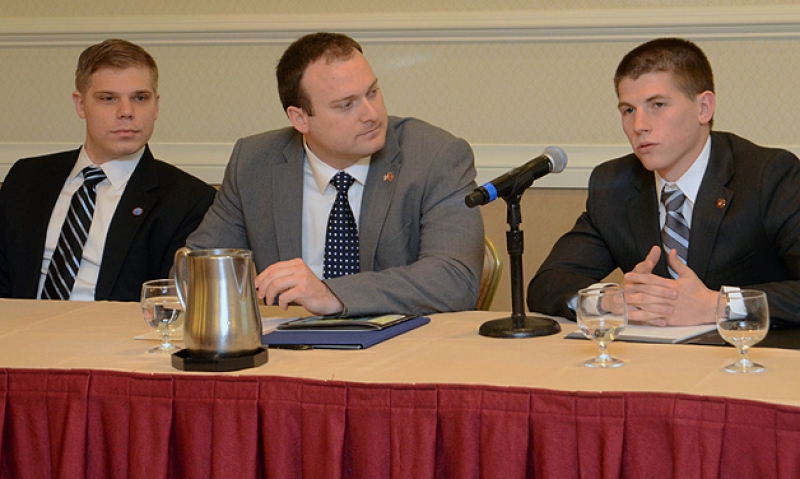
Symposium focuses on student veterans
Legionnaires, student veterans and academic authorities met at the Washington Hilton on Feb. 26 to examine some of the issues facing veterans on campus, and how well the academic community is responding to ensure their success.
Karen Gross, a senior policy advisor in the Department of Education, was featured as a speaker. She mentioned the Veterans Upward Bound program in her opening remarks, "which is an important program to help vets transition to college, and provides them with certain information about their eligibility requirements, and helps prepare them for access to the collegiate arena. It is a program that you should know about and one that is there to support vets as they reflect on the possibility of higher education."
Gross underscored the value of GI Bill veterans education benefits by noting that college tuition and fees have increased by 135 percent in the past 20 years. As higher education grows more expensive, its influence on future earning power is also increasing. Gross said that, on average, for every dollar a college graduate earns, a non-graduate now earns only 55 cents.
Four panels, including one made up of student veterans, talked about successful programs and promising practices to support student veterans on campus. They also discussed barriers to the development of such services and what could be done further to help veterans graduate from college and go on to successful careers.
John Kamin, an Army veteran of the Iraq War, is now a student at American University. He and other veterans approached the administration with the idea of speaking to students about their military experiences and what it means to be a veteran; they ended up talking to more than 500 freshmen. "If you realize those experiences can be helpful, most of (the veterans) are willing and open to taking that opportunity. It was generally a positive experience. I’m happy we did that, because it engaged both our veterans and the community."
A student veteran at Georgetown University, Colby Howard said the campus wasn’t very aware of its veteran population when he first showed up. To create some awareness, he and others created the Veterans Support Team, a working group that approached the administration with specific recommendations on how to provide support and services for those students who have served in uniform.
"You discuss the veterans’ issues in the same room. That support team meeting creates a heightened level of awareness and actually puts you on the radar. Our goal, our number one priority as a student organization, was to create a full-time, salaried and with benefits, position at Georgetown for a veterans coordinator, to be that focal point, not only for current veterans but for prospective ones as well.
"I’m happy to say that we accomplished that, and we went from essentially one certifying official in the registrar - and certifying student veterans was his ‘fifth hat’ - to having a full-time veterans coordinator."
Howard said it is better to "use honey" than to "throw hatchets" when asking for improved student veterans services. It is important to highlight the benefits that veterans bring to schools as active members of the student community, and to educate the student body, the media and alumni about the value of veterans on campus.
Another student veteran at Georgetown, T.M. Gibbons-Neff, said the first step in working toward more services is "making it known that veterans are actually on campus. A lot of veterans come to school and they don’t want to be known, they don’t want to come into a room and announce themselves as being someone with a diverse, professional background - combat deployments, what have you. Just make it known in your discussions, in your classes, that you are there and bringing something to the table."
Gibbons-Neff said there was some initial push-back from the university administration over the issue of providing a resource center for veterans. "But once we made it clear that we were there to work with them, to bring the university up to speed - let’s face it, this is pretty standard that there’s a support structure for veterans on campus - then the doors started to crack and we were allowed to come in and sit at the meetings.’
Three other panels at the symposium featured women veterans, higher-education administrators and representatives from veterans service organizations. The event was sponsored and organized by national staff of The American Legion’s National Economic Commission.
